人教版八年级下册Unit 1What's the matter? Section A 1a-1c 课件 (共26张PPT,内嵌音频)
文档属性
| 名称 | 人教版八年级下册Unit 1What's the matter? Section A 1a-1c 课件 (共26张PPT,内嵌音频) |
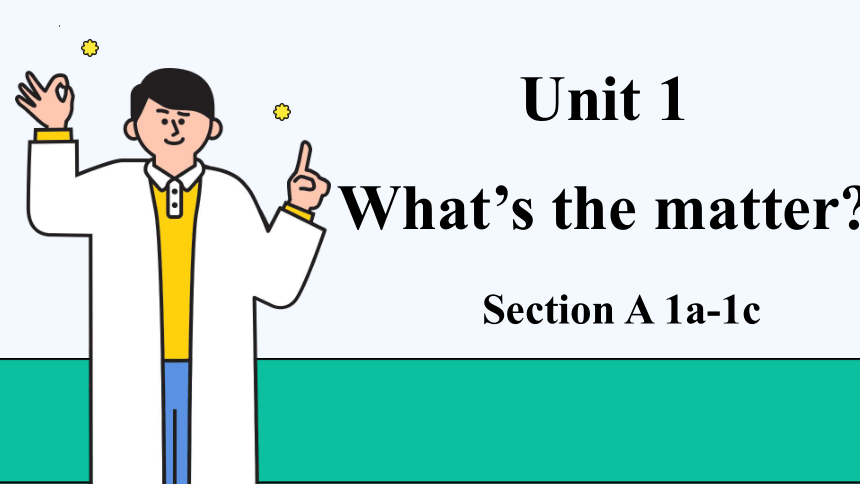
|
|
| 格式 | pptx | ||
| 文件大小 | 9.6MB | ||
| 资源类型 | 教案 | ||
| 版本资源 | 人教新目标(Go for it)版 | ||
| 科目 | 英语 | ||
| 更新时间 | 2024-09-10 10:38:24 | ||
图片预览

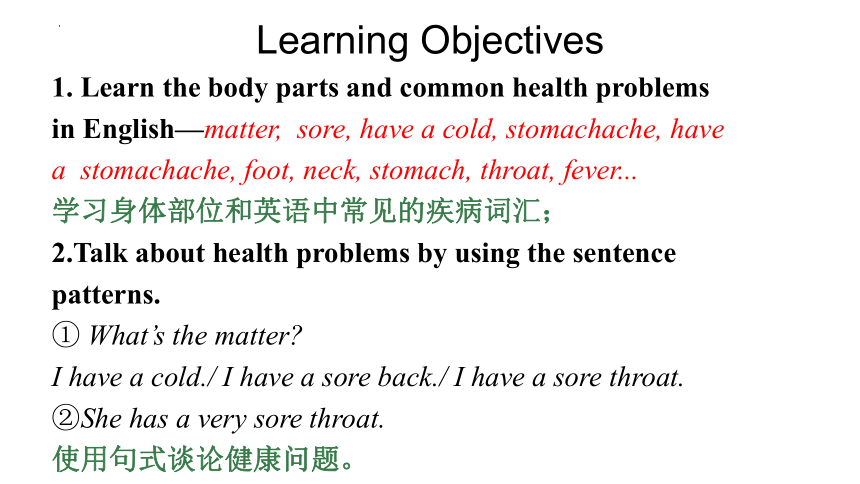
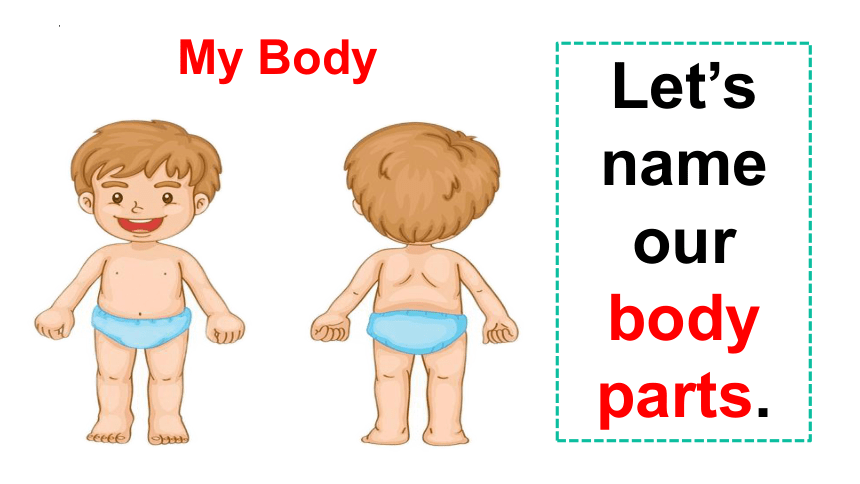
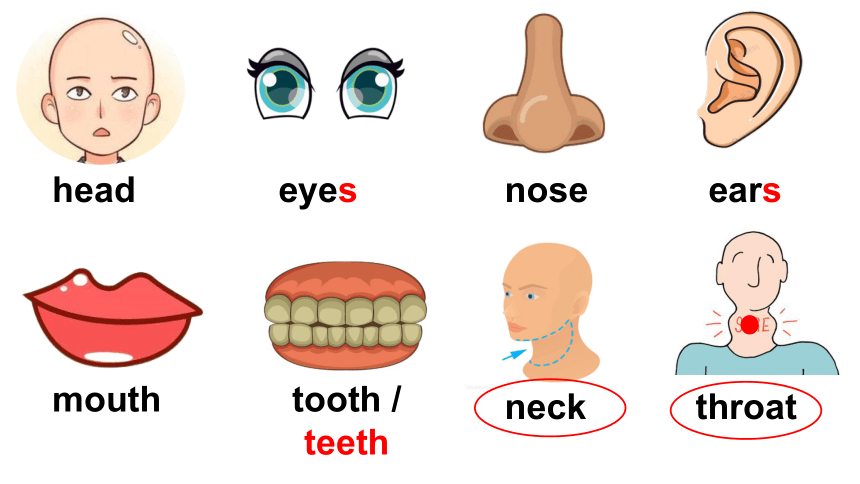
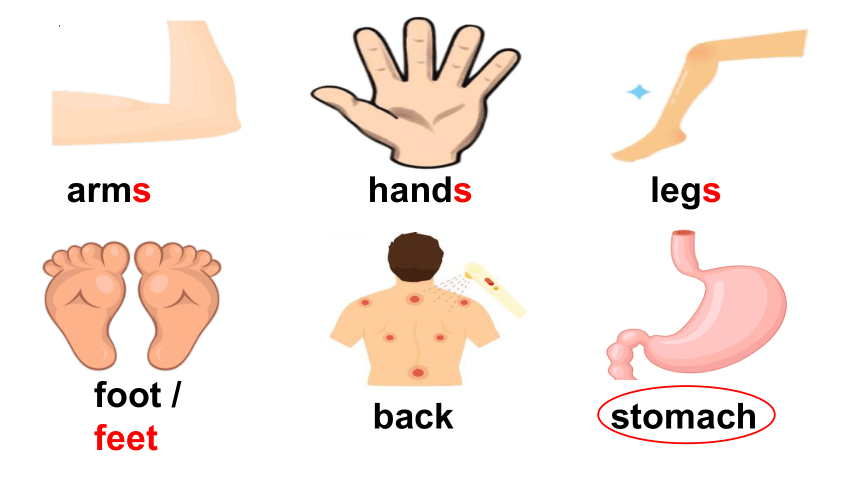
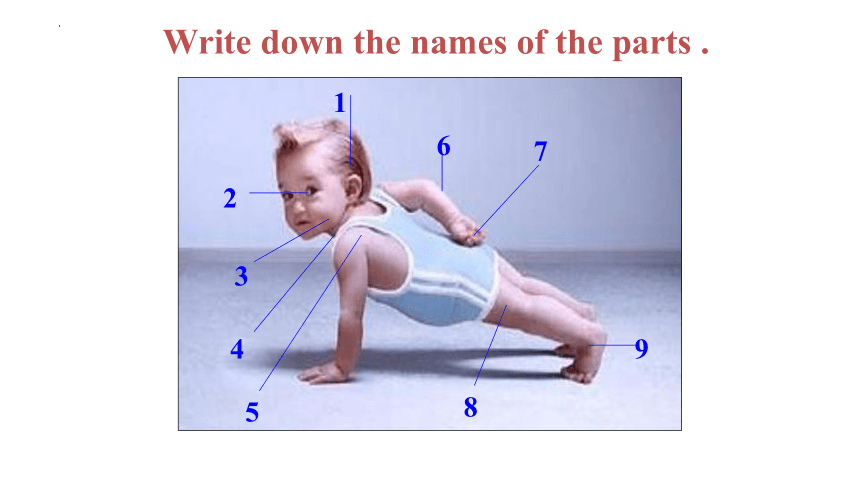
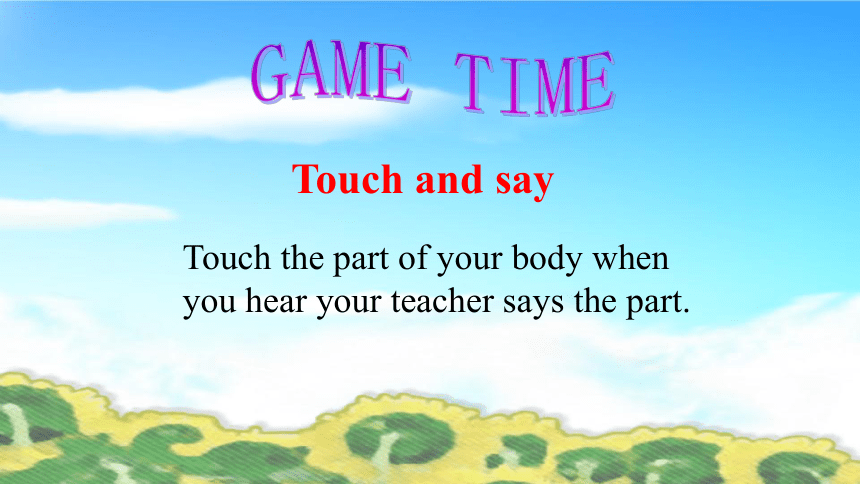
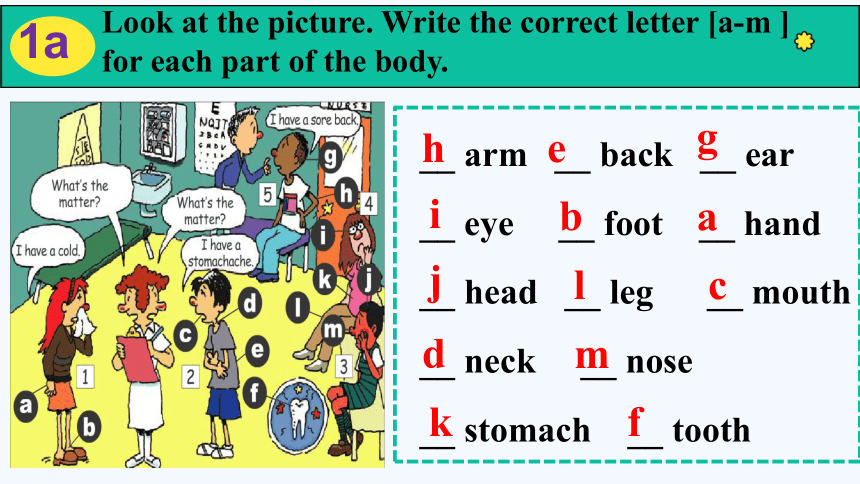
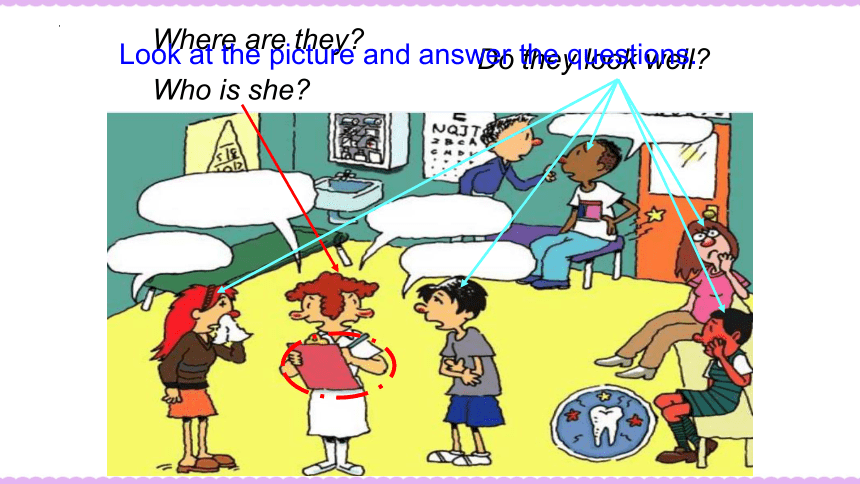
文档简介
(共26张PPT)
Unit 1
What’s the matter
Section A 1a-1c
Learning Objectives
1. Learn the body parts and common health problems in English—matter, sore, have a cold, stomachache, have a stomachache, foot, neck, stomach, throat, fever...
学习身体部位和英语中常见的疾病词汇;
2.Talk about health problems by using the sentence patterns.
① What’s the matter
I have a cold./ I have a sore back./ I have a sore throat. ②She has a very sore throat.
使用句式谈论健康问题。
My Body
Let’s name our
body parts.
head
eyes
nose
ears
mouth
tooth /
teeth
neck
throat
arms
hands
legs
foot / feet
back
stomach
1
2
3
4
5
6
7
9
8
Write down the names of the parts .
Touch and say
Touch the part of your body when you hear your teacher says the part.
GAME TIME
Look at the picture. Write the correct letter [a-m ] for each part of the body.
1a
__ arm __ back __ ear
__ eye __ foot __ hand
__ head __ leg __ mouth
__ neck __ nose
__ stomach __ tooth
h
e
g
i
b
a
j
l
c
d
m
k
f
Where are they
Who is she
Do they look well
Look at the picture and answer the questions.
Look at the picture again. What’s the matter with them
She has a cold.
He has a stomachache.
He has a sore back.
She has a sore throat.
She has a toothache.
They are heath problems. .
sore throat
cold
toothache
headache
cough
stomachache
sore leg
fever
What health problems do you know
What’s the matter with ...
If somebody has health problems, you can ask:
I+have a +病症.
If somebody doesn’t
feel well, he can say:
I+have a +sore +疼痛部位.
I+have a +疼痛部位-ache.
I+hurt my+身体部位.
I+have a +pain in+身体部位.
常用sore修饰的词:
throat, leg, foot, eye
常加后缀-ache构成的词:
head, tooth, stomach, ear, heart
两者都可用的词:back
Guessing
What’s the matter with them
have a cold
have a sore back
have a toothache
get a stomachache
What’s the matter with them
get a headache
have a fever
What’s the matter with them
have a cough
have a sore throat
What’s the matter with them
1b
Listen and look at the picture. Then number the names[1-5].
Nancy ___
Sarah ___
David ___
Ben _____
Judy ____
2
4
3
1
5
Because of the COVID-19,
our lives are badly influenced.
Listen again and fill in the blanks.
Name Problem Reason/Result
Sarah has a cold didn’t her jacket when it got windy.
David ________________ last night. ___________________
at his friend’s birthday party.
Ben _____________when playing soccer.
Nancy ___________very well last night. It hurts a lot.
Judy talked too much and didn’t
_______________________
got a stomachache
ate too much junk food
has a sore back
hurt himself
has a toothache
didn’t sleep
has a very sore throat
drink enough water.
put on
Sarah
Nurse
David
Ben
Nancy
Judy
Work in pairs and make a conversation.
A: What’s the matter with you,...
B: I have/got a…
What health problems did we learn
感冒 胃痛
发烧 喉咙痛
咳嗽 背痛
牙痛 腿痛
头痛 伤了自己
have a cold
have a fever
have a cough
have a toothache
have a stomachache
have a headache
have a sore throat
have a sore back
have a sore leg
hurt onself
Exercises
1.What’s the matter ______ Tom. He is wet through.
—His car ran _______ the river.
A. with; in B. to; into C. with; into
2.—_______
— I have a headache and I don’t feel like eating anything.
A. How are you B. What’s the matter with you
C. What can I do for you D. How do you like it
3.—What’s the matter with Tina
—_______.
A. She is away. B. She is cool.
C. She has a sore throat. D. She should take some medicine
C
B
C
4.We must brush our t____ twice a day .
5. ---What’s the m_____ with you --- I feel sick.
6. This kind of animal has a very long _____( 脖子)
7.Lily has a ________(tooth) . She has to see a
dentist right now .
8. He had a ________(头痛)yesterday , so he
didn’t go to school .
9. I have a sore _______(喉咙). I feel terrible .
10. I had a (stomach) last night , because
I ate too much ice-cream before going to bed.
eeth
atter
neck
toothache
headache
throat
stomachache
body parts
health problems
Summary
foot/ neck/ stomach/ throat/ back…
询问对方身体状况:What’s the matter…
表达“疼痛或不舒服”的三种常用结构:
(1)have/has+a+病症.
have a fever/cough/cold
(2)have/has +a+疼痛部位-ache
have a stomachache/headache…
(3)have/has+a+sore+疼痛部位
have a sore throat/eye/ back…
(4)hurt+身体部位
hurt my leg/myself
Homework:
1:Recite the conversations in 1b.
2:Finish self-check 1
Unit 1
What’s the matter
Section A 1a-1c
Learning Objectives
1. Learn the body parts and common health problems in English—matter, sore, have a cold, stomachache, have a stomachache, foot, neck, stomach, throat, fever...
学习身体部位和英语中常见的疾病词汇;
2.Talk about health problems by using the sentence patterns.
① What’s the matter
I have a cold./ I have a sore back./ I have a sore throat. ②She has a very sore throat.
使用句式谈论健康问题。
My Body
Let’s name our
body parts.
head
eyes
nose
ears
mouth
tooth /
teeth
neck
throat
arms
hands
legs
foot / feet
back
stomach
1
2
3
4
5
6
7
9
8
Write down the names of the parts .
Touch and say
Touch the part of your body when you hear your teacher says the part.
GAME TIME
Look at the picture. Write the correct letter [a-m ] for each part of the body.
1a
__ arm __ back __ ear
__ eye __ foot __ hand
__ head __ leg __ mouth
__ neck __ nose
__ stomach __ tooth
h
e
g
i
b
a
j
l
c
d
m
k
f
Where are they
Who is she
Do they look well
Look at the picture and answer the questions.
Look at the picture again. What’s the matter with them
She has a cold.
He has a stomachache.
He has a sore back.
She has a sore throat.
She has a toothache.
They are heath problems. .
sore throat
cold
toothache
headache
cough
stomachache
sore leg
fever
What health problems do you know
What’s the matter with ...
If somebody has health problems, you can ask:
I+have a +病症.
If somebody doesn’t
feel well, he can say:
I+have a +sore +疼痛部位.
I+have a +疼痛部位-ache.
I+hurt my+身体部位.
I+have a +pain in+身体部位.
常用sore修饰的词:
throat, leg, foot, eye
常加后缀-ache构成的词:
head, tooth, stomach, ear, heart
两者都可用的词:back
Guessing
What’s the matter with them
have a cold
have a sore back
have a toothache
get a stomachache
What’s the matter with them
get a headache
have a fever
What’s the matter with them
have a cough
have a sore throat
What’s the matter with them
1b
Listen and look at the picture. Then number the names[1-5].
Nancy ___
Sarah ___
David ___
Ben _____
Judy ____
2
4
3
1
5
Because of the COVID-19,
our lives are badly influenced.
Listen again and fill in the blanks.
Name Problem Reason/Result
Sarah has a cold didn’t her jacket when it got windy.
David ________________ last night. ___________________
at his friend’s birthday party.
Ben _____________when playing soccer.
Nancy ___________very well last night. It hurts a lot.
Judy talked too much and didn’t
_______________________
got a stomachache
ate too much junk food
has a sore back
hurt himself
has a toothache
didn’t sleep
has a very sore throat
drink enough water.
put on
Sarah
Nurse
David
Ben
Nancy
Judy
Work in pairs and make a conversation.
A: What’s the matter with you,...
B: I have/got a…
What health problems did we learn
感冒 胃痛
发烧 喉咙痛
咳嗽 背痛
牙痛 腿痛
头痛 伤了自己
have a cold
have a fever
have a cough
have a toothache
have a stomachache
have a headache
have a sore throat
have a sore back
have a sore leg
hurt onself
Exercises
1.What’s the matter ______ Tom. He is wet through.
—His car ran _______ the river.
A. with; in B. to; into C. with; into
2.—_______
— I have a headache and I don’t feel like eating anything.
A. How are you B. What’s the matter with you
C. What can I do for you D. How do you like it
3.—What’s the matter with Tina
—_______.
A. She is away. B. She is cool.
C. She has a sore throat. D. She should take some medicine
C
B
C
4.We must brush our t____ twice a day .
5. ---What’s the m_____ with you --- I feel sick.
6. This kind of animal has a very long _____( 脖子)
7.Lily has a ________(tooth) . She has to see a
dentist right now .
8. He had a ________(头痛)yesterday , so he
didn’t go to school .
9. I have a sore _______(喉咙). I feel terrible .
10. I had a (stomach) last night , because
I ate too much ice-cream before going to bed.
eeth
atter
neck
toothache
headache
throat
stomachache
body parts
health problems
Summary
foot/ neck/ stomach/ throat/ back…
询问对方身体状况:What’s the matter…
表达“疼痛或不舒服”的三种常用结构:
(1)have/has+a+病症.
have a fever/cough/cold
(2)have/has +a+疼痛部位-ache
have a stomachache/headache…
(3)have/has+a+sore+疼痛部位
have a sore throat/eye/ back…
(4)hurt+身体部位
hurt my leg/myself
Homework:
1:Recite the conversations in 1b.
2:Finish self-check 1
同课章节目录
- Unit 1 What's the matter?
- Section A
- Section B
- Unit 2 I'll help to clean up the city parks.
- Section A
- Section B
- Unit 3 Could you please clean your room?
- Section A
- Section B
- Unit 4 Why don't you talk to your parents?
- Section A
- Section B
- Unit 5 What were you doing when the rainstorm came
- Section A
- Section B
- Review of Units 1-5
- Unit 6 An old man tried to move the mountains.
- Section A
- Section B
- Unit 7 What's the highest mountain in the world?
- Section A
- Section B
- Unit 8 Have you read Treasure Island yet?
- Section A
- Section B
- Unit 9 Have you ever been to a museum?
- Section A
- Section B
- Unit 10 I've had this bike for three years.
- Section A
- Section B
